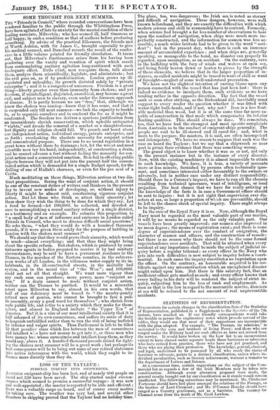LOSS OF THE TAYLEITR :
JUDICIAL INQUIRY INTO SIIIPWRECKS.
IxornEn emigrant-ship has been lost, and of nearly 600 people on board not 250 have been saved. The ship started under circum- stances which seemed to promise a successful 'voyage: it was new and well-appointed ; the master is reported to be able and efficient ; there was a valuable cargo on board, and of course every motive for taking care, The weather was very bad, and several other disasters to shipping proved that the Tayleur had no holiday time.
The place, too, was dangerous ; the Irish sea is noted as stormy and difficult of navigation. These dangers, however, were well known beforehand, and they are exactly the difficulties with which modern science and skill in seamanship have to contend. Formerly, when science had brought a far less number of observations to bear upon the conduct of navigation, when ships were much more im- perfectly constructed, and the information for seamen was less ac- cessible, a much wider latitude had to be given to the word " acci- dent": but in the present day, when there is such an immense amount of accumulated experience ; and when ships are, generally speaking, so manageable to the hand, no disaster can properly be regarded, upon assumption, as an accident. On the contrary, save in the buffeting with the fury of winds and waters at open sea, and being fairly beaten down or beaten to pieces by the strength of those elements, we believe that in the larger proportion of in- stances, so-called accidents might be traced to want of skill or want of foresight—neglect of some well-understood precaution. We have not the slightest intention of casting blame upon any person connected with the vessel that has just been lost : there is indeed no evidence to inculpate them, such evidence as we have tending rather in the opposite direction. The fact that the vessel sank so soon after striking, as the Birkenhead did, inevitably must suggest to every reader the question whether it was fitted with water-tight bulk-heads, and if not, why not? Iron is a less float- able material than wood, but it is at the same time far more ca- pable of construction in that mode which compensates its inferior floating qualities. This should always be done. We remember, too, that we have had the strongest and most specific complaints from Australia as to the conduct of emigrant-ships generally. The people are said to be ill-stowed and ill cared-for; and, what is more to the purpose, the masters, it is said, are often incompetent and intemperate. We have no reason to suppose that such was the case on board the Tayleur ; but we say that a shipwreck so near port is prima facie evidence that there was something wrong. The grand object is to know whether it was so or not, not only in the present instance but in the instance of every disaster. Now, with the existing machinery it is almost impossible to attain to such knowledge. We have, it is true, a variety of accounts more or less minute, furnished by persons often technically igno- rant, and sometimes interested either favourably to the owners or adversely, but in neither case under any distinct responsibility. Should there be a Coroner's inquest, we have to run all the chances resulting from technical ignorance, want of intelligence, or local prejudice. The best chance that we have for really arriving at the knowledge of the facts is in case a Government officer should be sent to inquire : but it is not right that supervision over dis- asters at sea, so large a proportion of which are preventible, shouhl be left to the chance cheek of special inquiry. There ought always to be inquiry. In the case of the Royal Navy it is so. Now, although the Royal Navy must be regarded as the most valuable part of our marine, it will by no means be regarded as the only valuable part. Our vessels have been greatly improved; our seamen also improved in no mean degree ; the means of registration exist; and there is some degree of superintendence over the conduct of emigration, the character of seamen and officers, and the construction of vessels: but there is no reason why there should not be the same formal superintendence over accidents. That will be attained when every accident of any importance shall be made the subject of judicial in- quiry before a regular tribunal ; as every officer in the Navy who gets into such difficulties is now subject to inquiry before a court- martial. In such cases the inquiry constitutes no imputation upon the officer. On the contrary, an honourable acquittal is his cer- tificate against any misconstruction which an unexplained disaster might entail upon him. But there is this salutary fact, that an inefficient officer gets marked as such ; and every officer knows that every failing in his duty will be rendered the subject of strict in- quiry, subjecting him to the loss of rank and employment. As soon as that is the law in regard to the mercantile marine, disasters at sea will be reduced to the net amount of real unpreventible accidents.






























 Previous page
Previous page